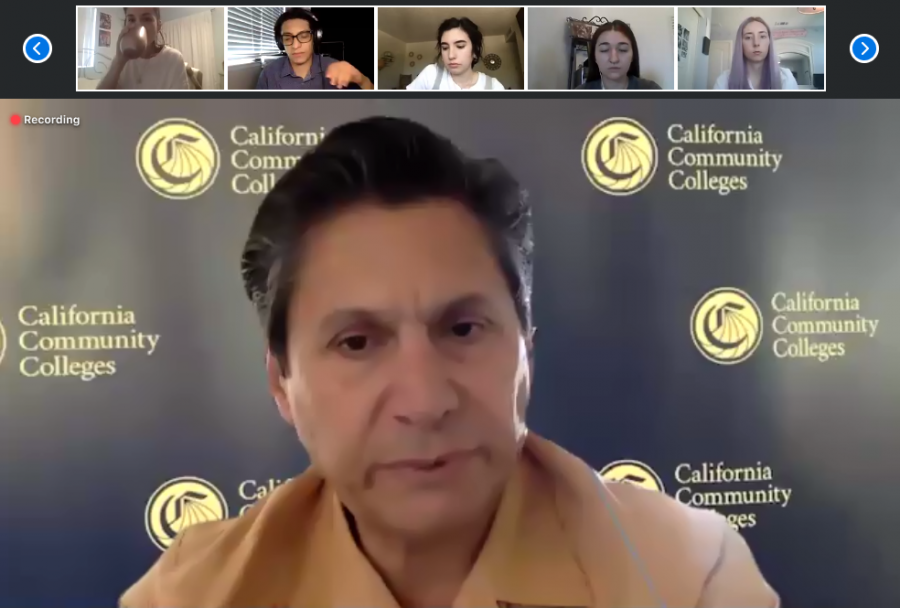Your donation will support the student journalists of San Diego Mesa College. Your contribution will allow us to purchase equipment and cover our annual website hosting costs.
Photo Credit: Renee Schmiedeberg California Community Colleges Chancellor Eloy Ortiz Oakley responds to college students across California amid COVID-19 in a teleconference.
‘It’s likely we’ll be in this position in the fall, perhaps in the spring,’ says Chancellor Oakley
May 5, 2020
California Community Colleges Chancellor Eloy Ortiz Oakley responded to growing student concerns over how COVID-19 changes their education in a teleconference meeting that took place mid-April.
Extension of distance learning into fall and spring semesters, allocation of funds, and sanitization of campuses were some questions Chancellor Oakley addressed in a teleconference with over a hundred student media representatives. Either Chancellor Oakley or Executive Vice Chancellor for Educational Services Marty Alvarado answered questions.
Unsurprisingly, the most pressing question students had was whether campuses would open for the fall semester. The decision to open or close campuses for fall has not yet been decided, according to Oakley. He added that the California Community Colleges Chancellor’s Office has directed all California colleges to be prepared to educate under at least some social distancing protocol for fall 2020 and spring 2021. This could mean partially open in terms of physical locations, hybrid courses, and entirely online courses. When fall classes resume, they expect some form of social distancing to be the norm, Oakley said. “Even if we are able to come back to campus, it won’t be in the same way that we’re used to. We won’t be able to have large lecture halls,” added Oakley. “ … Because this episode isn’t a one-time deal, we are likely to be in this situation again in the fall, it’s possible that we could be in this situation in the spring.”
All San Diego Mesa College courses abruptly resumed online on March 23, making internet and technology access integral to the continuation of students’ classes. Myriad students across the nation relied on their campuses for technology, and are now suffering from lack of access. Oakley added that Gov. Gavin Newsom’s team was well aware of the issue. “If there is a silver lining out of this craziness, it is that it’s clearly exposed this problem in California, the most technologically advanced state in the nation has some of the worst access to broadband in the country. And that’s… maddening because it not only affects college students, but K-12 as well.” said Oakley.
Despite the COVID-19 questions, Oakley started the meeting by stressing the grave importance of college students’ participation in the 2020 Census. According to Oakley, college students are at risk of being undercounted. Numbers collected from the 2020 Census will have direct results in the amount of federal resources and representations in congressional leadership that will have a decade-long impact, until the next census, in 2030. Money and other resources allocated to communities correlates to the amount of people counted in those communities.
Participation in the 2020 Census during COVID-19 is even more important than usual due to the likely cuts in revenue that goes towards community colleges, said Oakley. “The bottom line is this — one: we don’t know how big of an impact this is going to be at because we’re not through this crisis yet, what we do know is that there will be an impact, and like previous recessions, it will restrict revenue which directly impacts community colleges, so there will likely be cuts to our budgets.”
For information on participating in the 2020 Census visit www.californiacensus.org.
While COVID-19 has created a trove of issues for California community colleges, the chancellor is most concerned with getting students and families employed with good quality jobs, and close the digital divide equity.
For other issues discussed during the meeting, see below.
Sanitization: To ensure each facility is safe for the public when campuses open, all colleges are working with their local public health agencies to deploy the guidance from their local public health department. A student at the meeting expressed great concern for sanitization and Oakley assured the student that the Chancellor’s Office was taking it very seriously as it meant the health of everyone—students, faculty, and staff.
What the CARES Act mean for undocumented students: Half of the money given from the CARES Act specifically goes to student need without restriction. Undocumented students will be treated the same as documented students.
Improved access to technology: The Chancellor’s office is asking the Gov. Gavin Newsom for the state to provide support for access to broadband in their budget.
Refunds: If a student has a COVID-19 related circumstance, they can expect a refund for dropped classes related to COVID-19. The college will not be penalized for giving refunds, meaning they will not lose enrollment dollars.
Sports: Do not expect any athletic events with crowds.

